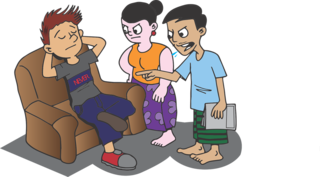Parenting
Overparenting: Too Much of a Good Thing
Three types of overparenting and effects on your child.
Posted July 23, 2022 Reviewed by Vanessa Lancaster
Key points
- Overprotectiveness, overcontrolling, and over-permissive are types of overparenting that can affect your child negatively throughout life.
- Adjustments in parenting based on your child's development will produce optimal results.
- Psychotherapy later in life may be necessary to neutralize the effects of overparenting.
Overparenting can inhibit the development of confidence, competence, and independence. This can have long-standing effects on personality development. Ongoing modifications in parenting intensity and involvement can support the development of confidence and autonomy rather than inhibit it.
Optimal parenting requires that the parent keep pace with the child’s ongoing development. Human infants require complete care to survive. Over the course of the first 18 years of life, the child becomes increasingly capable of self-care as their brains develop, but they need the experience to develop skills and confidence in those skills. Overparenting can deprive them of this opportunity.
Overprotectiveness
Good parents protect their children from harm out of love and responsibility. This important task needs to be counterbalanced by the child’s need to experience feeling unsafe so that he/she can develop the ability to create safety, which will also increase their confidence in the ability to do so. Optimal parenting requires constant adjustment of this balance as the child matures.
Tina and Gian
When Gian was a baby, Tina was meticulous at keeping Gian’s environment free from anything that could hurt him. She provided toys and other appropriate stimulation, but only after she inspected for hygiene and safety.
As a toddler, Gian explored his environment just as all toddlers do. This made Tina very anxious and she spent his toddlerhood preventing him from exploring areas she was uncomfortable with and yelling at him when he tried. Eventually he stopped trying.
When Gian entered kindergarten, he was frightened by his new environment. He now feared exploring things without his mother’s clearance. He fought his mother every day because he did not want to go to school. Tina could understand Gian’s fears as she felt similarly. She decided to home-school him.
Gian was very smart and Tina did a fine job providing a home school curriculum. He ended up being a good candidate for some top universities. He was fearful to leave the safety that his mother provided, so he applied community college and attended from home. Due to COVID he was able to complete most of his studies online.
He easily obtained his degree and needed to decide what to do next. He was paralyzed at the thought of leaving home without his mother. At his mother’s suggestion, he got a job that he could do remotely.
Gian went weeks without leaving his home. He had no friends as he was afraid to meet people outside of his mother’s home. He ended up becoming depressed, ultimately requiring professional help with his mood and extracting himself from an overprotective environment.

Overcontrolling
Optimal parenting requires constantly challenging the child with tasks that build character, skill, confidence and independence. This involves a persistent transfer of control from the parent to the child as the child develops the capability.
Sometimes parents focus more on getting tasks done efficiently and competently than developing skills. This can result in the child’s overcompensating by being rebellious in adolescence and adulthood.
Bruno and Garrett
Bruno loved his son Garrett. Bruno loved being a Marine and believed this would be best for his son. He taught Garrett that there was one right way to do things. He taught him a very specific method for tying his shoelaces, brushing his teeth, styling his hair, etc. He did not ask Garrett how he wanted to do things. He told him how to do everything.
At first, Garrett idealized his father and wanted to be just like him. As he entered adolescence, he developed some of his own ideas. He wanted to dress differently and wear his hair differently. He became interested in things that were foreign to Bruno, such as going to live theater and playing video games. Bruno saw these differences as errors and his hobbies as wasteful.
Garrett quickly learned not to share his ideas with Bruno. He did not share with his father things that Bruno would disagree with. He began to see all authority figures as restrictive, like his father. He did not like to be told what to do and had difficulty following the directions of teachers or employers.
Garrett’s difficulty taking directions from authority figures made it hard for him to support himself legally. He ended up getting in trouble with the law. He continues to work with his probation officer to accept structure, guidance and support from authority figures without resenting them.
Over-Permissive
Some parents equate love with acquiescence and cooperation. They put few restrictions or demands on their children. They do not provide much structure and they offer little discipline. They are more like friends to their children than parents.
Overpermissive parenting prevents children from developing the ability to cope with frustration. These children are raised in an environment where nothing is ever refused and they never have to wait. When they have to function in the world, they lack the coping skills to wait, compromise or accept limits or boundaries. This inhibits the child’s development of the ability to modulate their emotions and leaves them often out of control.
Jordan
Jordan was raised in a household where he could do whatever he wanted. His parents made no demands on him regarding studies, hygiene or respectful behavior.
Jordan was witty and others were drawn to him, but his inability to tolerate frustration prevented any of these relationships from blossoming. As soon as others disagreed with him or his wishes, he lashed out at them, often saying hurtful things.
This behavior drove away friends and relatives. It also impaired his ability to hold a job because he had no tolerance of being told what to do or how to do it. This made it almost impossible to work in any business or institution. Unfortunately, his parents continued their permissiveness and were willing to support him indefinitely.
The three types of overparenting described above encourage the development of unhealthy character traits. Gian suffered from avoidance associated with fearfulness.
Garrett became oppositional, and Jordan became intolerant. Offering less of a good thing as your child matures can help avoid the development of these unhealthy character traits throughout their lifetime.




